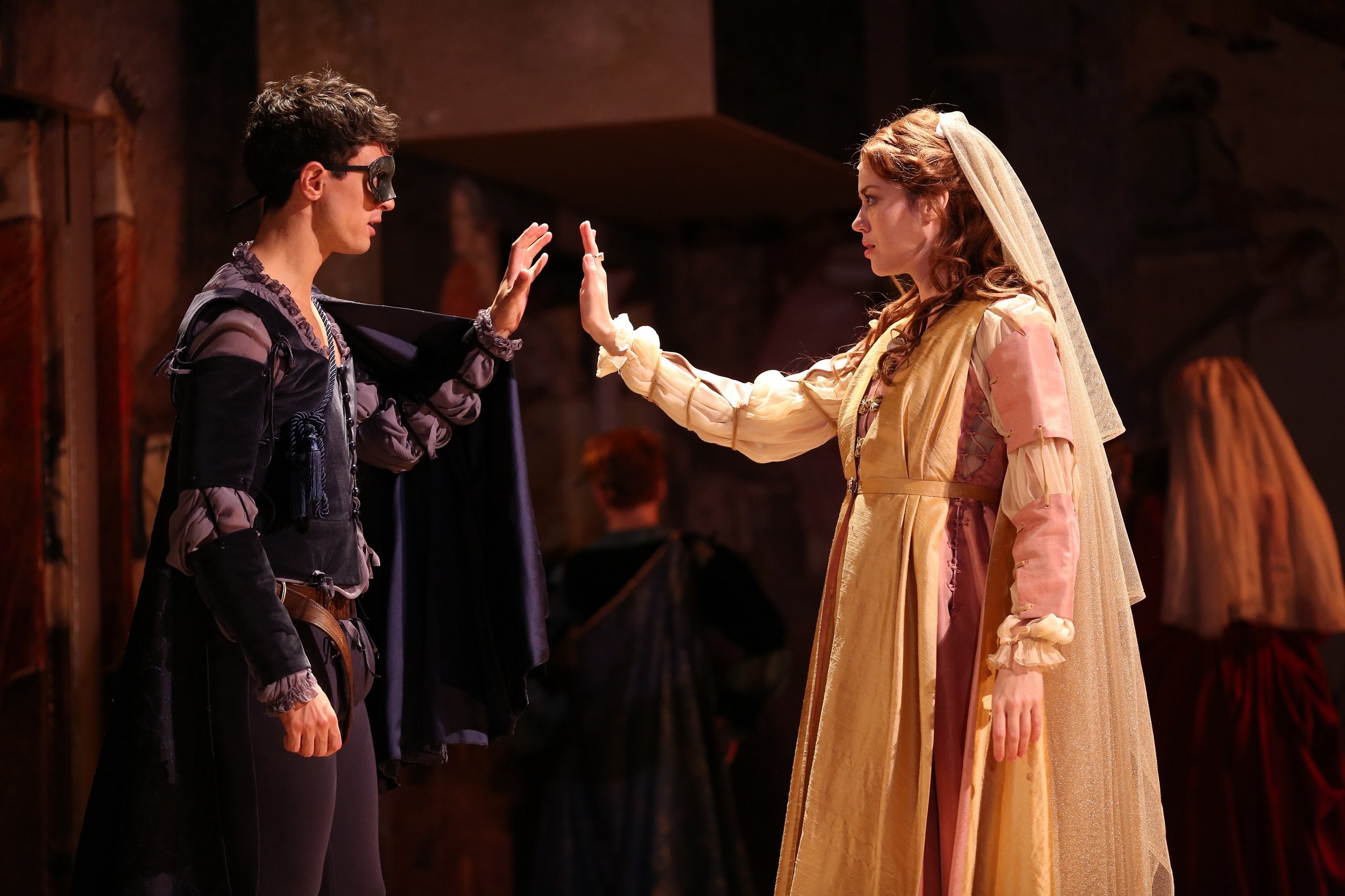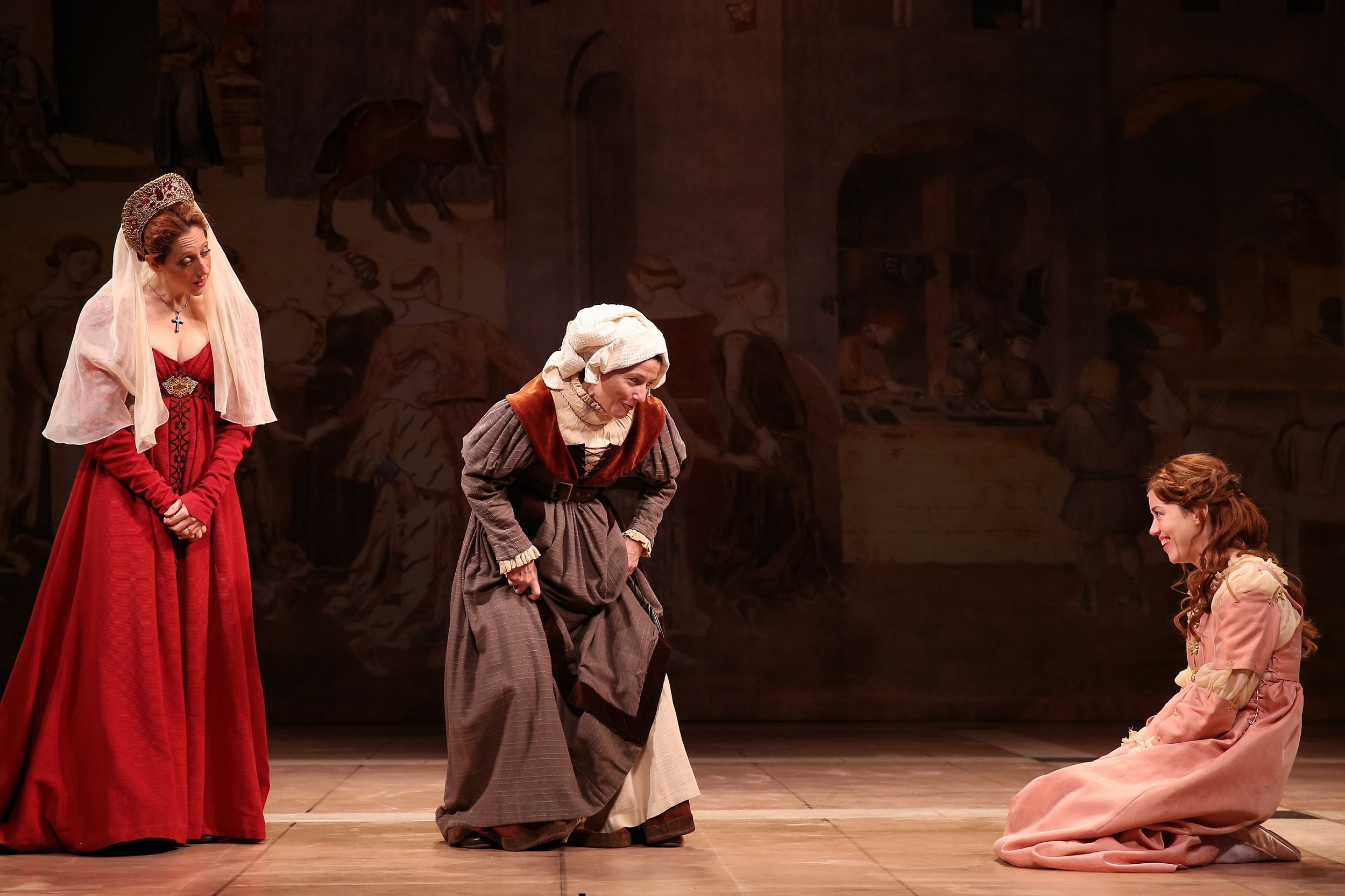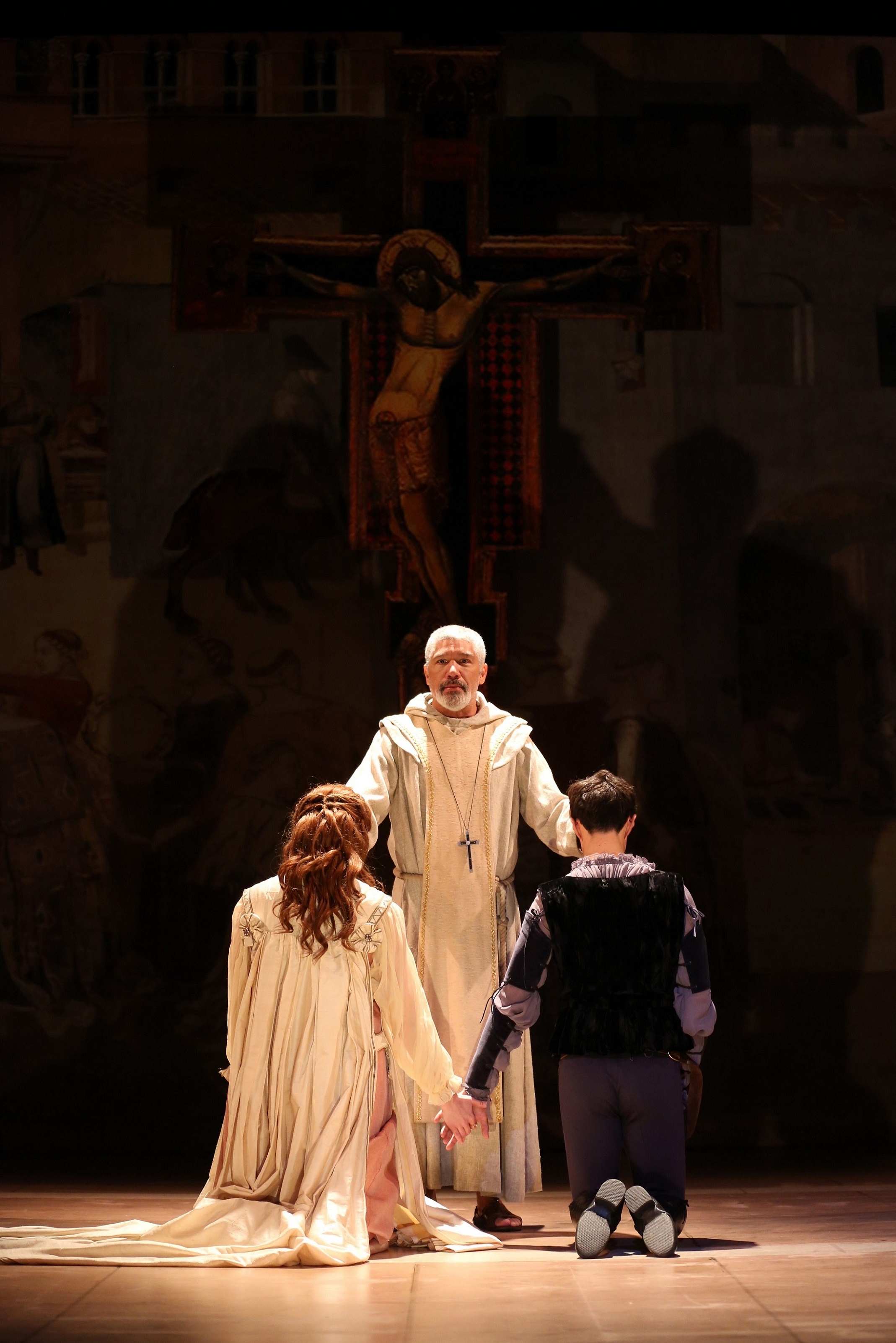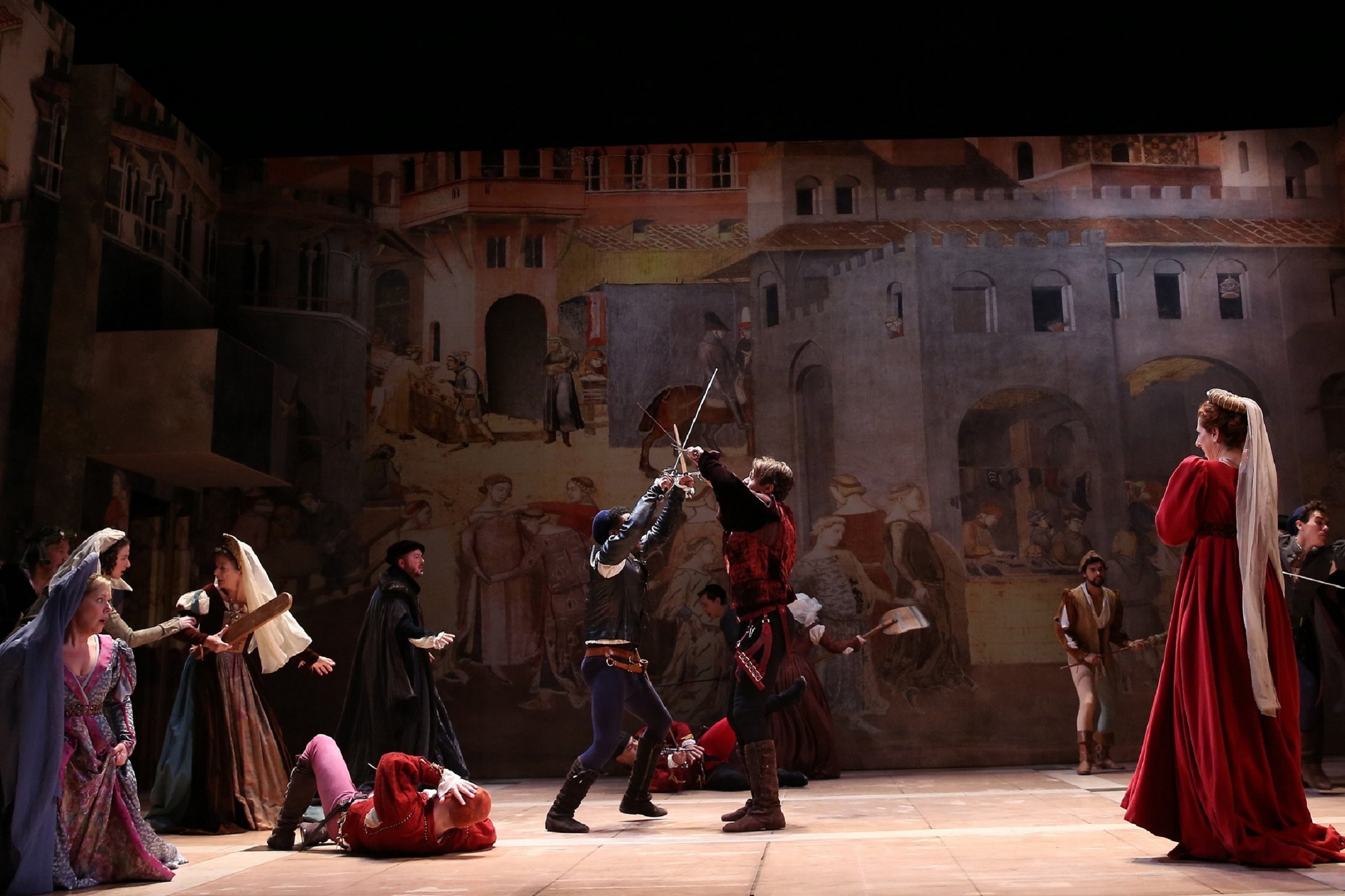Review of Romeo and Juliet, Westport Country Playhouse
So often are the plays of Shakespeare given contemporary trappings or the style of a specific period, it seems an innovation to maintain an Elizabethan manner of presentation. This Mark Lamos aspires to—more or less—in the current Westport Country Playhouse production of Romeo and Juliet. Seeing the play given more stately cadences than is often the case helps us see the play anew. In my view, Shakespeare’s best-known play more than ever unfolds as a test of wills, and the tragedy comes from a younger generation sacrificed to enmity through a failed subterfuge.
Romeo (James Cusati-Moyer), Juliet (Nicole Rodenburg); photo credits: Carol Rosegg
The stage, with a wonderful tapestry-like backdrop, is bare as can be imagined. The space, whether a home or a street or the friar’s cell, accommodates few furnishings or props. Such openness makes us see the characters as speech and movement, and the Westport production has much to feast the eye on, with Fabian Fidel Aguilar’s sumptuous costumes, the dramatic arrangements of bodies, and Lamos’ eye for tableau.
There’s a courtliness to the whole that does away with the naturalism that most productions use as a default mode. And that means the language of Shakespeare is allowed to be arcane when it must be and full of the surprise of utterance that is key to how his characters interact. We may feel that we are hearing some of these speeches for the first time. Certainly each character speaks as though compelled to give voice to strong feelings.
And yet it is not the protestations of love by Romeo (James Cusati-Moyer) and Juliet (Nicole Rodenburg) that remains most fully in the ear. The adults in the play almost swamp the young lovers with their advice and exhortations and ultimatums. Which is as it should be as the lovers here seem to be closer to their intended ages than is often the case. Cusati-Moyer, in particular, plays immature well. Though neither actor is teen-aged, they come across as impetuous and, more importantly, as governed by what pleases them. And what would please each most is being in love.
Romeo (James Cusati-Moyer), Juliet (Nicole Rodenburg)
For Romeo that wish is a generalized hunger; we first meet him pining for Rosalind who is indifferent, only to come across Juliet who immediately feels as he does. And for Juliet, passionate attachment must be swift and sure as her father Capulet is only too eager to marry her off to any likely suitor. Lamos’ pacing of the pair’s tragic love lets us see how sudden it is for them, how undetected by all but their trusted confidantes—more on those in a moment—and how it lives for them the way any new sensation does for the young: as something that has never been known before, ever. What’s striking is that we seem to overhear these lovers rather than watch them play out a passion for our benefit.
As Capulet, Triney Sandoval displays the moods of patriarchy to telling effect. He shrugs off Romeo’s presence at the Capulet party, if only to browbeat his nephew, Tybalt (Dave Register). Then is even more eager to browbeat his daughter, married unbeknownst to him, when she’s not eager to wed Countee Paris (Cole Francum). Capulet is a bully, plainly, and the play is, among other things, a way to give him a comeuppance, much as it does his wife, played without irony by Alison Cimmet: her fault is to depend too much upon Juliet’s nurse.
Capulet's Wife (Alison Cimmet), Nurse (Felicity Jones Latta), Juliet (Nicole Rodenburg)
As Nurse, Juliet’s only confidante, Felicity Jones Latta is a major asset of the production, likeable but also garrulous and apt to please rather than help. Due to his education, Nurse looks to Friar Laurence (Peter Francis James), Romeo’s only confidante, but that is also a fault. Here, the Friar is not overweening—hoping to teach a lesson to the warring houses of Capulet and Montague—so much as he is overwhelmed by the passion his young friends display. James gives to the Friar’s scenes with both Romeo and Juliet an anxiousness that lets us see how trying their conviction can seem to older and more retiring heads. He has passions of his own, though, and we see them all too well when his fanciful plan goes so horribly awry.
Foreground: Juliet (Nicole Rodenburg), Romeo (James Cusati-Moyer); Friar Laurence (Peter Francis James)
For ultimately, as this careful and deliberate production shows, the tragedy comes from misplaced faith. Rather than simply fly away together and take the consequences, the lovers allow themselves to be steered by their elders. And yet—so cunning is fate—the decisive blow (much as Romeo’s well-meaning interference cost Mercutio his life) comes from Romeo’s friend Balthasar, trying to do well.
As Mercutio, Patrick Andrews is a lusty showboat rather than a poetic fop besieged by his own imaginings, as is often the case. I begin to despair of ever finding an actor and director equal to trusting Mercutio’s language to do its work without broad gestures and hamming. Dave Register looks and acts “king of the cats” enough as Tybalt, and Tyler Fauntleroy’s Benvolio is quite able. As Montague’s wife, Barbara Hentschel wails well—we can believe she could die of grief, as indeed she does, before the worst arrives.
the Cast of Romeo & Juliet; center: Benvolio (Tyler Fauntleroy), Tybalt (Dave Register)
Viewers who want to fall in love with the lovers may find that the principals in Lamos’ Romeo and Juliet don’t court favor to that degree. Rodenburg registers uplift well, and her Juliet is quite her father’s daughter in her emphatic will. Cusati-Moyer made me consider Romeo for the first time as a tragic hero, his fault the vain belief that being good will do him good. The couple’s attachment seems to be for themselves alone and not a spectacle, which, to my mind, gives them a dignity beyond their years. And that is what makes them, ultimately, a hard lesson against long-standing feuds, and so uniquely matched, in love and in death.
Rather than treat Romeo and Juliet as something to be made anew, Mark Lamos’ production made me rethink what I thought I knew.
Romeo and Juliet
By William Shakespeare
Directed by Mark Lamos
Scenic Design: Michael Yeargan; Costume Design: Fabian Fidel Aguilar; Lighting Design: Matthew Richards; Sound Design: David Budries; Voice and Speech Consultant: Shane Ann Younts; Fight Director: Michael Rossmy; Props and Set Dressing: Faye Armon-Troncoso; Dramaturg: Milla Riggio; Casting: Tara Rubin Casting, Laura Schutzel, CSA; Production Stage Manager: Megan Smith
Cast: Patrick Andrews, Chris Bolan, J. Kenneth Campbell, Alison Cimmet, Adam Coy, James Cusati-Moyer, Tyler Fauntleroy, Cole Francum, Barbara Hentschel, Peter Francis James, Felicity Jones Latta, Jim Ludlum, Peter Molesworth, Dave Register, Nicole Rodenburg, Triney Sandoval, Becca Schneider, Clay Singer, Emily Vrissis, Jamil Zraikat
Westport Country Playhouse
October 31-November 19, 2017




